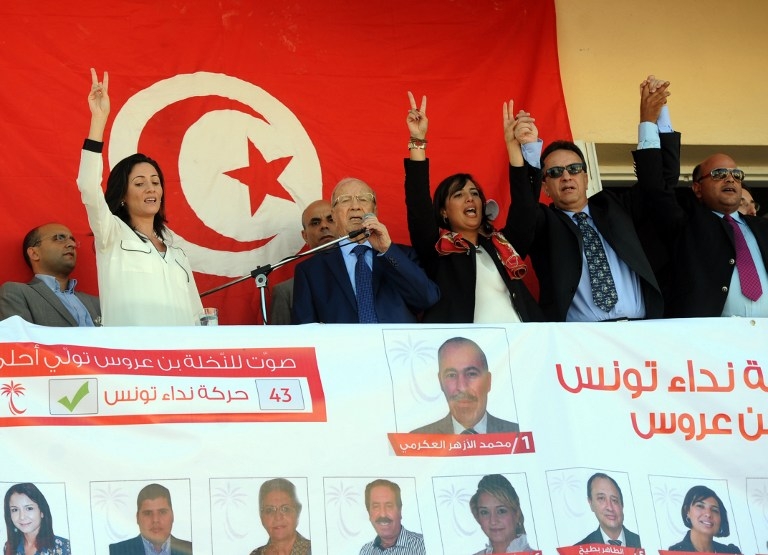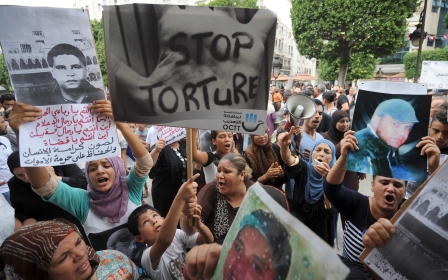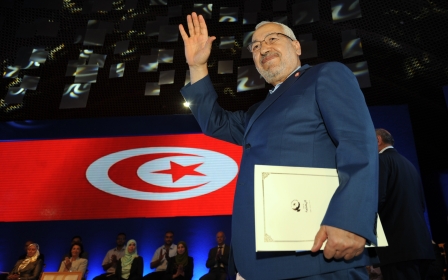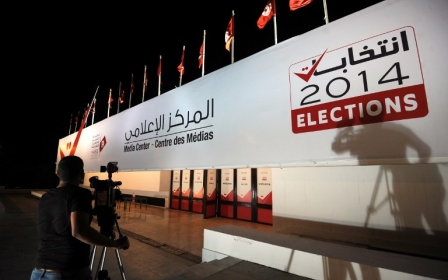Can Nidaa Tounes unite secular Tunisians?

TUNIS – “We have members in the Nidaa Tounes party who are hard leftists, many who are moderate liberals and others who used to be Islamists and decided that our programme is best for Tunisia,” said Slim Chaker, director of social and economic programmes in the party.
Founded in 2012 with the aim of pushing back against the then growing popularity of the Islamist Ennahda party, Nidaa Tounes (Arabic for “Call of Tunisia”) portrays itself as a technocratic party that seeks to unite secularists from across the ideological spectrum.
The party is led by 87-year-old Beji Caid Essebsi, who will represent Nidaa Tounes in the presidential elections later this year.
Nearly four years after Tunisians took the streets in a nationwide revolution that toppled 23-year strongman Zine Al Abdine Ben Ali, the country is holding historic democratic legislative elections on Sunday. The years since the revolution have not been easy. Though Tunisia has fared better than Syria and Libya, where uprisings devolved into sectarian and tribal violence, the country has suffered from deep ideological polarisation, economic stagnancy and limited political violence.
The National Constituent Assembly, a transitional governance body, was elected in October 2011 with Ennahda gaining a 41 percent plurality. Ennahda stepped down in January this year, and the body broke a months-long political deadlock by ratifying a new constitution in January and setting dates for parliamentary and presidential elections, the latter scheduled for November.
Though seen by many as the strongest presidential candidate, Essebsi has been sharply criticised by politicians and activists who point out his long political history as part of the Ben Ali regime.
Nawel Achour, 25, a legislative candidate in the Union for Tunisia electoral alliance, also criticised Nidaa Tounes’s strategy of portraying itself as the only hope for secular Tunisians. “We disagree with the view that there are only two political forces in this country,” she told Middle East Eye, referring to Nidaa Tounes and Ennahda.
According to Tunisia’s National Television, more than 13,000 candidates are each running for a five-year mandate in the 217-seat parliament.
“Tunisia has rich political diversity, and this is a good thing,” she said, adding that Nidaa Tounes was, before pulling out in May this year, a member of Union for Tunisia, a secularist alliance formed last year to fight this month’s election.
Nidaa Tounes also faces strong opposition from the moderate Islamist party, Ennahda, which has focused its efforts on the legislative elections and until now has not put forward a presidential candidate.
Yet, speaking to Middle East Eye in his Tunis office, Slim Chaker argues that Tunisia needs to unite against Ennahda “because the Islamists do not learn from their previous mistakes. What we need is not changing Tunisia’s social model, like Ennahda tried to impose on the country after the last elections.
“We hope that Ennahda learned from the past lessons, and that their change in rhetoric is genuine and not just for elections,” Chaker added. “Tunisia already has its own understanding of Islam, and it is compatible with modernity.”
Chaker says that Nidaa Tounes expects to pick up between 70 and 80 seats, or between 32 and 36 percent of the 217-person National Assembly. Ennahda leader Rached Ghannouchi recently told reporters that he estimates his party will gain 41 percent, or 89 seats.
Monica Marks, a Tunisia-based political analyst and doctoral researcher at Oxford University, said that Nidaa Tounes was able to form and build its base of “people of secular and leftist persuasion who were shocked by Ennahda’s success in the 2011 elections”.
“There is a definitely a big class element to it … with Nidaa Tounes relying mostly on upper-middle-class people in coastal areas of the country,” Marks told Middle East Eye.
“Over the past year and a half . . . I’ve heard far fewer young people supporting Nidaa Tounes. This is more about young people rejecting the two main parties. Nonetheless, the regional and class elements are more salient when examining Nidaa Tounes’s political support base.
“A lot of people from a more leftist persuasion thought that a religious group was the worst thing that could possibly happen,” Marks said, adding that Nidaa Tounes included “former members of the Ben Ali regime, leftists and urban intellectuals”.
Since then, however, its base has encountered splintering into a number of different secular parties and alliances. “However many votes Nidaa Tounes gets on Sunday, it could have gotten many more had it not broken away from the Union for Tunisia,” Marks said.
Nidaa Tounes has largely pinned its hopes on blaming its Islamist competitor for the country’s stagnant post-revolutionary economy, while capitalizing on Ennahda’s declining popular support.
According to new Pew Research poll, which was carried out in April and May, Ghannouchi only enjoyed a 33 percent approval rating, down from a a 66 percent rating just two years ago. Essebsi, however, was viewed as favorable by 51 percent of those polled.
That same poll found that the most important issue for the majority of citizens is the economy, which 88 percent of those polled “describe as bad”, with 73 percent preferring a stable economy over democratic governance.
With unemployment hovering above fifteen percent since 2013, inflation, at present running just below 6 percent, has further burdened the struggling economy.
According to Chaker, Nidaa Tounes' programme seeks to jump-start the economy by developing historically neglected areas of the country, such as parts of the south and near the Libyan and Algerian borders, as well as attracting native and foreign investors.
“We will also focus on decreasing youth unemployment,” Chaker said. “Further, we are going to focus on technological and communications development and the textiles sector to combat unemployment nationwide.”
Economic stability will aid the state in its struggle with security threats posed by militant groups such as Ansar al-Sharia, an Islamist organisation believed to have launched attacks against security forces in recent years, Chaker said.
Hassen Zargouni, founder of Sigma Consiel and a World Bank adviser, said that all of the political parties have placed attracting development, combating smuggling and tackling unemployment as high priorities on their economic programmes.
Zargouni warned that recovery will “not happen immediately. There is no magic button to press for a solution to the economic problems.”
The findings of a report published by the World Bank in March suggest that Tunisia’s economic problems are largely rooted in decades of manipulative policies and call for more than accelerated development.
Under Ben Ali’s rule, “companies that were confiscated and given to his extended family accounted for just 1 percent of jobs but were able to reap a formidable 21 percent of the country’s private-sector profits”, economists Antonio Nuciforo and Erik Churchill pointed out in the Washington Post.
If current estimates prove accurate, the National Assembly will likely have to be run by a coalition between Nidaa Tounes and Ennahda.
According to Tunisia researcher Marks, “a coalition government might be a good exercise in power sharing for everyone. Ennahda has been very careful to not use exclusionary language against Nidaa [Tounes]”.
“Nidaa Tounes seems to be a lot less mentally prepared for the prospects of coalition sharing [with Ennahda],” she concluded. “There are very powerfully placed people inside the party who have an ‘over-my-dead-body’ approach, and it will be a very interesting process of political learning.”
Middle East Eye propose une couverture et une analyse indépendantes et incomparables du Moyen-Orient, de l’Afrique du Nord et d’autres régions du monde. Pour en savoir plus sur la reprise de ce contenu et les frais qui s’appliquent, veuillez remplir ce formulaire [en anglais]. Pour en savoir plus sur MEE, cliquez ici [en anglais].




